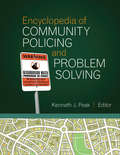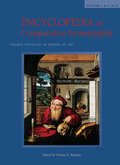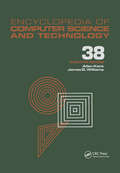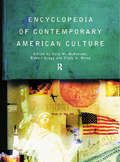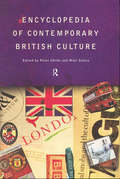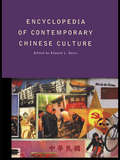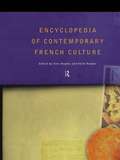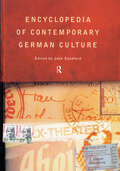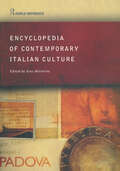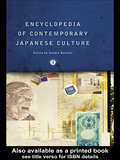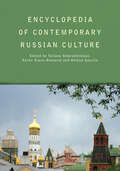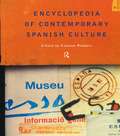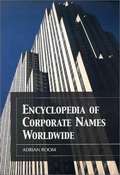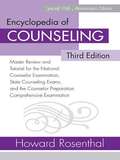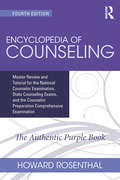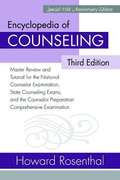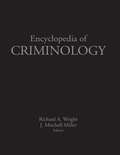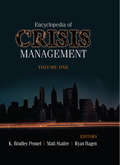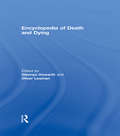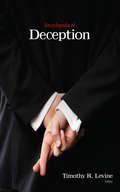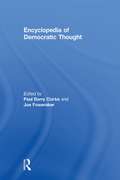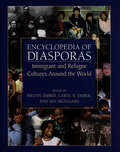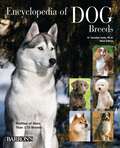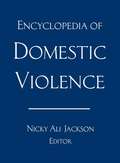- Table View
- List View
Encyclopedia of Community Policing and Problem Solving
by Dr Kenneth J. PeakCommunity policing, as a philosophy, supports the systematic use of partnerships and problem-solving techniques to proactively address the immediate conditions that give rise to public safety issues, including crime, social disorder, and fear of crime—as opposed to responding to crime after it occurs. Community policing expands the traditional police mandate. It broadens the focus of fighting crime to include solving community problems and forming partnerships with people in the community so average citizens can contribute to the policing process. Originating during police reform efforts of the 1970s, the philosophy of community policing is currently widespread and embraced by many citizens, police administrators, scholars, and local and federal politicians. What sorts of collaborative partnerships have evolved between policing agencies and the individuals and communities they serve? How do police departments engage in systematic examination of identified problems to develop effective responses? How have police departments aligned their organizational structures to best support community partnerships and proactive problem solving? Just how effective have efforts at community policing been? These questions and more are explored within the pages of this new reference work.Features:A collection of 150 to 175 entries are organized in A-to-Z fashion in one volume available in both electronic and print formats.Signed entries, authored by significant figures in the field, each conclude with Cross-References and Suggestions for Further Readings to guide students to in-depth resources.Brief "What Works" case studies within appropriate entries profile community policing programs and strategies as tried in various cities and communities.Although organized in A-to-Z fashion, a thematic "Reader's Guide" in the front matter groups related entries by broad topic areas (e.g., Foundations; Methods & Practices; Legislation & National Organizations; Changing Agency Culture; Planning & Implementation; Training & Curriculum; Assessment & Evaluation; etc.).Also included in the front matter, a Chronology provides students with historical perspective of the development of community policing.The entire work concludes with a Resources appendix listing classic books, journals, and associations, followed by a comprehensive Index.
Encyclopedia of Comparative Iconography: Themes Depicted in Works of Art
by Helene E. RobertsFirst published in 1998. The Encyclopedia of Comparative Iconography compares the uses of iconographic themes from mythology, the Bible and other sacred texts, literature, and popular culture in works of art through various periods, cultures, and genres. Art historians now tend to study narrative themes depicted in works of art in relation to such subjects as gender and sexuality, politics and power, ownership and possession, ceremony and ritual, legitimacy and authority. The Encyclopedia of Comparative Iconography reflects these new approaches by ordering the themes of various iconographic sources in particular biblical, mythological, and literary texts according to these new emphases.Each handsomely illustrated entry discusses the major relevant iconographic narratives and the historical background of each theme. A list of selected works of art that accompanies each essay guides the reader to examples in art that depict the theme under discussion. Each essay includes a list of suggested reading that provides further sources of information about the themes. A general bibliography of reference books is listed separately and can be used in association with all the essays. With 119 entries written by 42 experts, the Encyclopedia of Comparative Iconography is an important reference work for art historians, students of art history, artists, and the general reader.
Encyclopedia of Computer Science and Technology: Volume 38 - Supplement 23: Algorithms for Designing Multimedia Storage Servers to Models and Architectures (Computer Science And Technology Encyclopedia Ser.)
by Allen KentVolume 38 - Supplement 23: Algorithms for Designing Multimedia Storage Servers to Models and Architectures. Covering more than basic computer commands and procedures, this encyclopaedia summarizes how technology has developed, the future of computer programs and applications, and the significance of computer components. Following an introduction and overview, there are approximately 750 to 800 entries.
Encyclopedia of Contemporary American Culture (Encyclopedias of Contemporary Culture)
by Robert Gregg Gary W. McDonogh Cindy H. WongAs a meeting point for world cultures, the USA is characterized by its breadth and diversity. Acknowledging that diversity is the fundamental feature of American culture, this volume is organized around a keen awareness of race, gender, class and space and with over 1,200 alphabetically-arranged entries - spanning 'the American century' from the end of World War II to the present day - the Encyclopedia provides a one-stop source for insightful and stimulating coverage of all aspects of that culture.Entries range from short definitions to longer overview essays and with full cross-referencing, extensive indexing, and a thematic contents list, this volume provides an essential cultural context for both teachers and students of American studies, as well as providing fascinating insights into American culture for the general reader. The suggestions for further reading, which follows most entries, are also invaluable guides to more specialized sources.
Encyclopedia of Contemporary British Culture (Encyclopedias of Contemporary Culture)
by Peter Childs Mike StorryBoasting more than 970 alphabetically-arranged entries, the Encyclopedia of Contemporary British Culture surveys British cultural practices and icons in the latter half of the twentieth century. It examines high and popular culture and encompasses both institutional and alternative aspects of British culture. It provides insight into the whole spectrum of British contemporary life. Topics covered include: architecture, pubs, film, internet and current takes on the monarchy. Cross-referencing and a thematic contents list enable readers to identify related articles. The entries range from short biographical synopses to longer overview essays on key issues. This Encyclopedia is essential reading for anyone interested in British culture. It also provides a cultural context for students of English, Modern History and Comparative European Studies.
Encyclopedia of Contemporary Chinese Culture (Encyclopedias of Contemporary Culture)
by Edward L. DavisThis is the first reference book to digest this vast cultural output and make it accessible to the English-speaking world. It contains nearly 1,200 entries written by an international team of specialists, to enable readers to explore a range of diverse and fascinating cultural subjects from prisons to rock groups, underground Christian churches to TV talk shows and radio hotlines. Experimental artists with names such as 'Big-Tailed Elephants' and 'The North-Pole Group' nestle between the covers alongside entries on lotteries, gay cinema, political jokes, sex shops, theme parks, 'New Authoritarians' and 'Little Emperors'. While the focus of the Encyclopedia of Contemporary Chinese Culture is on mainland China since 1980, it also includes longer, specially commissioned entries on various aspects of contemporary culture in Hong Kong and Taiwan. Including full and up-to-date references for further reading, this is an indispensable reference tool for all teachers and students of contemporary Chinese culture. It will also be warmly embraced as an invaluable source of cultural context by tourists, journalists, business people and others who visit China.
Encyclopedia of Contemporary French Culture (500 Tips)
by Alex Hughes Keith ReaderMore than 700 alphabetically organized entries by an international team of contributors provide a fascinating survey of French culture post 1945. Entries include:* advertising * Beur cinema * Coco Chanel * decolonization * écriture feminine * football * francophone press * gay activism * Seuil * youth cultureEntries range from short factual/biographical pieces to longer overview articles. All are extensively cross-referenced and longer entries are 'facts-fronted' so important information is clear at a glance. It includes a thematic contents list, extensive index and suggestions for further reading.The Encyclopedia will provide hours of enjoyable browsing for all francophiles, and essential cultural context for students of French, Modern History, Comparative European Studies and Cultural Studies.
Encyclopedia of Contemporary German Culture (Encyclopedias Of Contemporary Culture Ser.)
by John SandfordWith more than 1,100 entries written by an international group of over 150 contributors, the Encyclopedia of Contemporary German Culture brings together myriad strands of social, political and cultural life in the post-1945 German-speaking world. With a unique structure and format, an inclusive treatment of the concept of culture, and coverage of East, West and post-unification Germany, as well as Austria and Switzerland, the Encyclopedia of Contemporary German Culture is the first reference work of its kind. Containing longer overviews of up to 2,000 words, as well as shorter factual entries, cross-referencing to other relevant articles, useful further reading suggestions and extensive indexing, this highly useable volume provides the scholar, teacher, student or non-specialist with an astonishing breadth and depth of information.
Encyclopedia of Contemporary Italian Culture (Encyclopedias Of Contemporary Culture Ser.)
by Gino MoliternoThis rigorously compiled A-Z volume offers rich, readable coverage of the diverse forms of post-1945 Italian culture. With over 900 entries by international contributors, this volume is genuinely interdisciplinary in character, treating traditional political, economic, and legal concerns, with a particular emphasis on neglected areas of popular culture. Entries range from short definitions, histories or biographies to longer overviews covering themes, movements, institutions and personalities, from advertising to fascism, and Pirelli to Zeffirelli.The Encyclopedia aims to inform and inspire both teachers and students in the following fields:*Italian language and literature *Arts, Humanities and Social Sciences *European Studies *Media and Cultural Studies *Business and Management *Art and DesignIt is extensively cross-referenced, has a thematic contents list and suggestions for further reading.
Encyclopedia of Contemporary Japanese Culture (Routledege Encyclopedias Of Contemporary Culture Ser.)
by Sandra BuckleyOffering extensive coverage, this Encyclopedia is a new reference that reflects the vibrant, diverse and evolving culture of modern Japan, spanning from the end of the Japanese Imperialist period in 1945 to the present day. Entries cover areas such as literature, film, architecture, food, health, political economy, religion and technology and they range from shorter definitions, histories or biographies to longer overview essays giving an in-depth treatment of major issues.With over 700 alphabetically arranged entries, this Encyclopedia will be an invaluable reference tool for students of Japanese and Asian Studies, as well as providing a fascinating insight into Japanese culture for the general reader. Suggestions for further reading, a comprehensive system of cross-referencing, a thematic contents list and an extensive index all help navigate the reader around the Encyclopedia and on to further study.
Encyclopedia of Contemporary Russian Culture (Encyclopedias Of Contemporary Culture Ser.)
by Karen Evans-Romaine Helena Goscilo Tatiana SmorodinskayaThis addition to the highly successful Contemporary Cultures series covers the period from period 1953, with the death of Stalin, to the present day. Both ‘Russian’ and ‘Culture’ are defined broadly. ‘Russian’ refers to the Soviet Union until 1991 and the Russian Federation after 1991. Given the diversity of the Federation in its ethnic composition and regional characteristics, questions of national, regional, and ethnic identity are given special attention. There is also coverage of Russian-speaking immigrant communities. ‘Culture’ embraces all aspects of culture and lifestyle, high and popular, artistic and material: art, fashion, literature, music, cooking, transport, politics and economics, film, crime – all, and much else, are covered, in order to give a full picture of the Russian way of life and experience throughout the extraordinary changes undergone since the middle of the twentieth century. The Encyclopedia of Contemporary Russian Culture is an unbeatable resource on recent and contemporary Russian culture and history for students, teachers and researchers across the disciplines. Apart from academic libraries, the book will also be a valuable acquisition for public libraries. Entries include cross-references and the larger ones carry short bibliographies. There is a full index.
Encyclopedia of Contemporary Spanish Culture (Encyclopedias of Contemporary Culture)
by Eamonn RodgersSome 750 alphabetically-arranged entries provide insights into recent cultural and political developments within Spain, including the cultures of Catalonia, Galicia and the Basque country. Coverage spans from the end of the Civil War in 1939 to the present day, with emphasis on the changes following the demise of the Franco dictatorship in 1975.Entries range from shorter, factual articles to longer overview essays offering in-depth treatment of major issues. Culture is defined in its broadest sense. Entries include:*Antonio Gaudí * science * Antonio Banderas * golf * dance * education * politics * racism * urbanization This Encyclopedia is essential reading for anyone interested in Spanish culture. It provides essential cultural context for students of Spanish, European History, Comparative European Studies and Cultural Studies.
Encyclopedia of Corporate Names Worldwide
by Adrian RoomEntries in this encyclopedia give the stories behind some 3,500 commercial names, mainly from America and Britain but including some from European countries.
Encyclopedia of Counseling
by Howard RosenthalIn the third edition of Howard Rosenthal's best-selling test preparation guide for the National Counselor Examination (NCE), students get more help than ever with an expanded section on marriage and family counseling, new material on web counseling, and updated material throughout. This resource now includes over 1,050 tutorial questions/answers and a new "Final Review and Last Minute Super Review Boot Camp" section. This guide is an ideal review tool for state licensing, the NCC credential, and preparation for written and oral boards. And because the new Counselor Preparation Comprehensive Examination (CPCE), draws from the same subject areas, the Encyclopedia is a perfect study guide for the CPCE as well. Written in a unique question/answer format, with a quick reference index, this is also an essential student reference volume for use in any counseling, social work, or human services course. Download the accompanying app today! This effective, authoritative and easy-to-use exam preparation app offers over 300 questions to help you revise for, and pass, the National Counselor Examination (NCE) and the Counselor Preparation Comprehensive Examination (CPCE). Howard Rosenthal's best-selling test preparation guides have helped thousands of students pass the NCE and CPCE. In this accompanying app, test-takers will find more than 300 interactive multiple-choice questions (and detailed answers), including nearly 50 brand-new questions and answers and a summary of the October 2012 changes to the test. For Apple/iOS | For Android
Encyclopedia of Counseling: Master Review and Tutorial for the National Counselor Examination, State Counseling Exams, and the Counselor Preparation Comprehensive Examination
by Howard RosenthalWith more questions and answers than any other edition, the Encyclopedia of Counseling, Fourth Edition, is still the only book you need to pass the NCE, CPCE, and other counseling exams. Every chapter has new and updated material and is still written in Dr. Rosenthal's lively, user-friendly style counselors know and love. The book’s new and improved coverage incorporates a range of vital topics, including social media, group work in career counseling, private practice and nonprofit work, addictions, neurocounseling, research trends, the DSM-5, the new ACA and NBCC codes of ethics, and much, much more.
Encyclopedia of Counseling: Master Review and Tutorial for the National Counselor Examination, State Counseling Exams, and the Counselor Preparation Comprehensive Examination (Third Edition)
by Howard RosenthalIn the third edition of Howard Rosenthal's best-selling test preparation guide for the National Counselor Examination (NCE), students get more help than ever with an expanded section on marriage and family counseling, new material on web counseling, and updated material throughout. This resource now includes over 1,050 tutorial questions/answers and a new "Final Review and Last Minute Super Review Boot Camp" section. This guide is an ideal review tool for state licensing, the NCC credential, and preparation for written and oral boards. And because the new Counselor Preparation Comprehensive Examination (CPCE), draws from the same subject areas, the Encyclopedia is a perfect study guide for the CPCE as well. Written in a unique question/answer format, with a quick reference index, this is also an essential student reference volume for use in any counseling, social work, or human services course.
Encyclopedia of Criminology (The\wiley Series Of Encyclopedias In Criminology And Criminal Justice Ser.)
by J. Mitchell Miller Richard A. WrightThis three-volume work offers a comprehensive review of the pivotal concepts, measures, theories, and practices that comprise criminology and criminal justice.No longer just a subtopic of sociology, criminology has become an independent academic field of study that incorporates scholarship from numerous disciplines including psychology, political science, behavioral science, law, economics, public health, family studies, social work, and many others. The three-volume Encyclopedia of Criminology presents the latest research as well as the traditional topics which reflect the field's multidisciplinary nature in a single, authoritative reference work. More than 525 alphabetically arranged entries by the leading authorities in the discipline comprise this definitive, international resource. The pivotal concepts, measures, theories, and practices of the field are addressed with an emphasis on comparative criminology and criminal justice. While the primary focus of the work is on American criminology and contemporary criminal justice in the United States, extensive global coverage of other nations' justice systems is included, and the increasing international nature of crime is explored thoroughly.Providing the most up-to-date scholarship in addition to the traditional theories on criminology, the Encyclopedia of Criminology is the essential one-stop reference for students and scholars alike to explore the broad expanse of this multidisciplinary field.
Encyclopedia of Crisis Management
by Matt Statler K. Bradley Penuel Ryan HagenAlthough now a growing and respectable research field, crisis management—as a formal area of study—is relatively young, having emerged since the 1980s following a succession of such calamities as the Bhopal gas leak, Chernobyl nuclear accident, Space Shuttle Challenger loss, and Exxon Valdez oil spill. Analysis of organizational failures that caused such events helped drive the emerging field of crisis management. Simultaneously, the world has experienced a number of devastating natural disasters: Hurricane Katrina, the Japanese earthquake and tsunami, etc. From such crises, both human-induced and natural, we have learned our modern, tightly interconnected and interdependent society is simply more vulnerable to disruption than in the past. This interconnectedness is made possible in part by crisis management and increases our reliance upon it. As such, crisis management is as beneficial and crucial today as information technology has become over the last few decades. Crisis is varied and unavoidable. While the examples highlighted above were extreme, we see crisis every day within organizations, governments, businesses and the economy. A true crisis differs from a "routine" emergency, such as a water pipe bursting in the kitchen. Per one definition, "it is associated with urgent, high-stakes challenges in which the outcomes can vary widely (and are very negative at one end of the spectrum) and will depend on the actions taken by those involved." Successfully engaging, dealing with, and working through a crisis requires an understanding of options and tools for individual and joint decision making. Our Encyclopedia of Crisis Management comprehensively overviews concepts and techniques for effectively assessing, analyzing, managing, and resolving crises, whether they be organizational, business, community, or political. From general theories and concepts exploring the meaning and causes of crisis to practical strategies and techniques relevant to crises of specific types, crisis management is thoroughly explored. Features & Benefits: A collection of 385 signed entries are organized in A-to-Z fashion in 2 volumes available in both print and electronic formats. Entries conclude with Cross-References and Further Readings to guide students to in-depth resources. Selected entries feature boxed case studies, providing students with "lessons learned" in how various crises were successfully or unsuccessfully managed and why. Although organized A-to-Z, a thematic "Reader's Guide" in the front matter groups related entries by broad areas (e.g., Agencies & Organizations, Theories & Techniques, Economic Crises, etc.). Also in the front matter, a Chronology provides students with historical perspective on the development of crisis management as a discrete field of study. The work concludes with a comprehensive Index, which—in the electronic version—combines with the Reader's Guide and Cross-References to provide thorough search-and-browse capabilities. A template for an "All-Hazards Preparedness Plan" is provided the backmatter; the electronic version of this allows students to explore customized response plans for crises of various sorts. Appendices also include a Resource Guide to classic books, journals, and internet resources in the field, a Glossary, and a vetted list of crisis management-related degree programs, crisis management conferences, etc.
Encyclopedia of Death and Dying
by Oliver Leaman Glennys HowarthIn recent years there has been a massive upsurge in academic, professional and lay interest in mortality. This is reflected in academic and professional literature, in the popular media and in the proliferation of professional roles and training courses associated with aspects of death and dying. Until now the majority of reference material on death and dying has been designed for particular disciplinary audiences and has addressed only specific academic or professional concerns. There has been an urgent need for an authoritative but accessible reference work reflecting the multidisciplinary nature of the field. This Encyclopedia answers that need.The Encyclopedia of Death and Dying consolidates and contextualizes the disparate research that has been carried out to date. The phenomena of death and dying and its related concepts are explored and explained in depth, from the approaches of varied disciplines and related professions in the arts, social sciences, humanities, medicine and the sciences.In addition to scholars and students in the field-from anthropologists and sociologists to art and social historians - the Encyclopedia will be of interest to other professionals and practitioners whose work brings them into contact with dying, dead and bereaved people. It will be welcomed as the definitive death and dying reference source, and an essential tool for teaching, research and independent study.
Encyclopedia of Deception
by Timothy R. LevineThe Encyclopedia of Deception examines lying from multiple perspectives drawn from the disciplines of social psychology, sociology, history, business, political science, cultural anthropology, moral philosophy, theology, law, family studies, evolutionary biology, philosophy, and more. From the “little white lie,” to lying on a resume, to the grandiose lies of presidents, this two-volume reference explores the phenomenon of lying in a multidisciplinary context to elucidate this common aspect of our daily lives. Not only a cultural phenomenon historically, lying is a frequent occurrence in our everyday lives. Research shows that we are likely to lie or intentionally deceive others several times a day or in one out of every four conversations that lasts more than 10 minutes. Key Features: More than 360 authored by key figures in the field are organized A-to-Z in two volumes, which are available in both print and electronic formats. Entries are written in a clear and accessible style that invites readers to explore and reflect on the use of lying and self-deception. Each article concludes with cross references to related entries and further readings. This academic, multi-author reference work will serve as a general, non-technical resource for students and researchers within social and behavioral science programs who seek to better understand the historical role of lying and how it is employed in modern society.
Encyclopedia of Democratic Thought
by Paul Barry Clarke Joe FowerakerContaining almost 200 entries from 'accountability' to the 'Westminster model' the Encyclopedia of Democratic Thought explores all the ideas that matter to democracy past, present and future. It is destined to become the first port-of-call for all students, teachers and researchers of political science interested in democratic ideas, democratic practice, and the quality of democratic governance. The Encyclopedia provides extensive coverage of all the key concepts of democratic thought written by a stellar team of distinguished international contributors. The Encyclopedia draws on every tradition of democratic thought, as well as developing new thinking, in order to provide full coverage of the key democratic concepts and engage with their practical implications for the conduct of democratic politics in the world today. In this way, it brings every kind of democratic thinking to bear on the challenges facing contemporary democracies and on the possibilities of the democratic future. The Encyclopedia is global in scope and responds in detail to the democratic revolution of recent decades. Referring both to the established democratic states of Western Europe, North America and Australasia, and to the recent democracies of Latin America, Eastern and Central Europe, Africa and Asia, classical democratic concerns are related to new democracies, and to important changes in the older democracies. Supplemented by full bibliographical information, extensive cross-referencing and suggestions for further reading, the Encyclopedia of Democratic Thought is a unique work of reference combining the expertise of many of the world's leading political scientists, political sociologists and political philosophers. It will be welcomed as an essential resource for both teaching and for independent study, and as a solid starting point both for further research and wider exploration.
Encyclopedia of Diasporas: Immigrant and Refugee Cultures around the World
by Carol R. Ember Melvin Ember Ian SkoggardImmigration is a topic that is as important among anthropologists as it is the general public. Almost every culture has experienced adaptation and assimilation when immigrating to a new country and culture; usually leaving for what is perceived as a "better life". Not only does this diaspora change the country of adoption, but also the country of origin. Many large nations in the world have absorbed, and continue to absorb, large numbers of immigrants. The foreseeable future will see a continuation of large-scale immigration, as many countries experience civil war and secessionist pressures. Currently, there is no reference work that describes the impact upon the immigrants and the immigrant societies relevant to the world's cultures and provides an overview of important topics in the world's diasporas. The encyclopedia consists of two volumes covering three main sections: Diaspora Overviews covers over 20 ethnic groups that have experienced voluntary or forced immigration. These essays discuss the history behind the social, economic, and political reasons for leaving the original countries, and the cultures in the new places; Topics discusses the impact and assimilation that the immigrant cultures experience in their adopted cultures, including the arts they bring, the struggles they face, and some of the cities that are in the forefront of receiving immigrant cultures; Diaspora Communities include over 60 portraits of specific diaspora communities. Each portrait follows a standard outline to facilitate comparisons. The Encyclopedia of Diasporas can be used both to gain a general understanding of immigration and immigrants, and to find out about particular cultures, topics and communities. It will prove of great value to researchers and students, curriculum developers, teachers, and government officials. It brings together the disciplines of anthropology, social studies, political studies, international studies, and immigrant and immigration studies.
Encyclopedia of Dog Breeds
by Caroline Coile Ph.D.The perfect dog book for dog lovers!Encyclopedia of Dog Breeds is the definitive guide for information on purebreed history, health, and pet care. Updated with the latest information on canine breeds recognized by the American Kennel Club, this lavishly illustrated volume has an all-new design and features a treasure trove of information for dog lovers, owners, breeders, and prospective buyers. From discussions of breed evolution to individual breed profiles, this incredible resource includes:Profiles on more than 175 different dog breeds—including 27 new breedsInformation on the categories specified by the AKC—Sporting Group, Hound Group, Working Group, Terrier Group, Toy Group, Non-Sporting Group, and Herding GroupTips for choosing a breed that's compatible with your lifestyle and needsAdvice for dog training and puppy trainingEach breed's health problems, longevity, exercise needs, compatibility with children, and more!Full of striking photographs, essential information, and valuable advice, this is a comprehensive, invaluable guide for dog people.
Encyclopedia of Dogs
by David AldertonDogs have been our closest animal companions since before the start of recorded history. They have traveled with us, fought with us, and saved countless lives. As society has changed over the course of millennia, so have dogs--a trend that is still apparent today, with dogs being kept increasingly for companionship rather than for working purposes. There is no universal system of breed classification for dogs but, generally, they are divided on the basis of their original function. Some categories such as the hound group are more natural than others, which may simply consist of breeds with diverse working ancestries. Not all breeds are recognized for show purposes, and recognition can vary between different organizations and countries.
Encyclopedia of Domestic Violence
by Nicky Ali JacksonThe Encyclopedia of Domestic Violence is a modern reference from the leading international scholars in domestic violence research. This ground-breaking project has created the first ever publication of an encyclopedia of domestic violence. The primary goal of the Encyclopedia is to provide information on a variety of traditional, as well as breakthrough, issues in this complex phenomenon. The coverage of the Encyclopedia is broad and diverse, encompassing the entire life span from infancy to old age. The entries include the traditional research areas, such as battered women, child abuse and dating violence. However, this Encyclopedia is unique in that it includes many under-studied areas of domestic violence, such as ritual abuse-torture within families, domestic violence against women with disabilities, pseudo-family violence and domestic violence within military families. It is also unique in that it examines cross-cultural perspectives of domestic violence. One of the key special features in this Encyclopedia is the cross-reference section at the end of each entry. This allows the reader the ability to continue their research of a particular topic. This book will be an easy-to-read reference guide on a host of topics, which are alphabetically arranged. Precautions have been taken to ensure that the Encyclopedia is not politically slanted; rather, it is hoped that it will serve as a basic guide to better understanding the myriad issues surrounding this labyrinthine topic. Topics covered include: Victims of Domestic Violence; Theoretical Perspectives and Correlates to Domestic Violence; Cross-Cultural Perspectives and Religious Perspectives; Understudied Areas within Domestic Violence Research; Domestic Violence and the Law; and Child Abuse and Elder Abuse.
